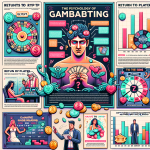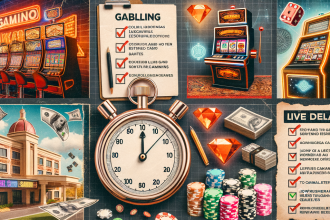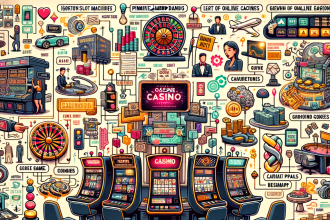Casino games have long fascinated players with the allure of winning big. As individuals sit down to play, they often grapple with a fundamental question: Is success in these games a result of skill or mere luck? This article will delve into the impact of skill in casino game outcomes and the role luck plays in shaping gambling experiences, ultimately arguing that while both elements are present, the balance varies significantly across different types of games.
Analyzing the Impact of Skill in Casino Game Outcomes
Understanding Skill-Based Games
In the realm of casino gaming, certain games undeniably hinge on player skill. Poker is a prime example, where the player’s ability to read opponents, calculate odds, and make strategic decisions can directly influence the outcome. Unlike games of chance, poker allows for a substantial amount of skill to come into play, distinguishing it from games like slots or roulette.
The dynamics of skill-based games can be broken down as follows:
- Decision Making: Players engage in complex decision-making processes, assessing their hands, potential outcomes, and opponents’ behaviors.
- Psychological Factors: Understanding opponents’ psychology and bluffing can significantly affect the game’s outcome, showcasing the importance of interpersonal skills.
- Mathematical Proficiency: Knowledge of probabilities and odds can lead to better betting strategies, enhancing a player’s overall performance.
Moreover, games like blackjack also accommodate skillful play. Players who are knowledgeable about card counting and optimal strategy can turn the odds in their favor. This skill can transform a player’s long-term expected outcome from a negative expected return to a positive one, illustrating the crucial role of skill in specific casino contexts.
The Fine Line Between Skill and Luck
While some games may emphasize skill, the influence of luck can never be entirely dismissed. Even in poker, where players can apply various strategies, the initial cards dealt are random and can significantly impact the outcome of the game. This dichotomy raises compelling discussions about the extent to which skill can truly influence results in a medium that is inherently unpredictable.
For instance, in a tournament setting, the best players can find themselves eliminated due to a series of unfavorable hands. This leads to the notion that, despite skill superiority, luck plays a pivotal role in determining short-term outcomes.
The Skill-Based Edge Over Time
In the long run, skill becomes a more dominant factor in certain games. Professional players in skill-based games often employ extensive practice and rigorous study to outplay their opponents over time. Notably, the concept of variance comes into play, where skilled players may experience short-term losses but emerge victorious over a longer timeline.
To illustrate the importance of skill over time, consider the following table highlighting the potential outcomes for skill-based and luck-based games:
| Game Type | Skill Impact | Luck Impact | Long-Term Expectation |
|---|---|---|---|
| Poker | High | Moderate | Positive for skilled players |
| Blackjack | High | Low | Positive for skilled players |
| Slot Machines | Low | High | Negative for all players |
| Roulette | Low | High | Negative for all players |
The table emphasizes that while luck can influence immediate outcomes, skill tends to yield positive results over time in games where it plays a significant role.
The Role of Luck: Unpredictability in Gambling Experiences
Understanding Luck in Casino Games
In contrast to skill-based games, many casino offerings are fundamentally luck-driven. Slot machines, for example, operate entirely on random number generators (RNG), ensuring that every spin is independent of previous outcomes. This unpredictability is central to their appeal but offers little room for skillful intervention.
The impact of luck in these games can be summarized as follows:
- Random Outcomes: Each game round is purely based on chance, with no influence from player decisions or skills.
- Psychological Thrill: The element of surprise and the potential for sudden wins create an exhilarating experience for players.
- High Variance: Players can experience significant swings in fortune, making the outcome highly volatile and unpredictable.
This unpredictability is what draws many individuals to casinos, as the mere chance of hitting the jackpot can lead to significant winnings, regardless of the player’s experience or skill level.
Luck’s Influence on Player Experience
Luck also shapes the emotional landscape of gambling. Players often ride an emotional rollercoaster based on their perceived luck. A “lucky streak” can bolster confidence and encourage further play, while a series of losses can lead to frustration and despair. This psychological aspect of luck is an important factor in the gambling experience, driving players to engage in what is sometimes referred to as the “gambler’s fallacy”—the mistaken belief that past outcomes affect future ones.
Moreover, the role of luck transcends the games themselves, influencing broader gambling behavior. Many players believe in lucky numbers, rituals, or charms, which can affect their decision-making process and overall enjoyment.
Balancing Skill and Luck in Casino Games
It is essential to recognize that while luck dominates some games, it can still intersect with skill in others. For example, in betting on sports, while luck plays a significant role, knowledgeable bettors use skill to analyze statistics and trends, aiming to make informed wagers. This suggests that while skill and luck may represent opposing forces, they often coexist within the gambling ecosystem.
Ultimately, the balance between skill and luck can vary widely across different games and player experiences. Understanding this dynamic allows players to make informed decisions about their gambling activities and expectations.
Conclusion
The debate over skill versus luck in casino games is complex and multifaceted. While skill plays a pivotal role in games like poker and blackjack, allowing knowledgeable players to shape their outcomes over time, luck remains a dominant force in many other games. Ultimately, both elements contribute to the richness of the gambling experience, further enhancing its allure.
As players engage in various games, recognizing the interplay between skill and luck will enable them to approach gaming with a more informed perspective, balancing their strategies and expectations accordingly. The world of casino gaming continues to thrive, driven by the delicate dance between the unpredictable nature of luck and the mastery of skill.










